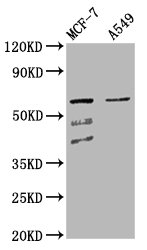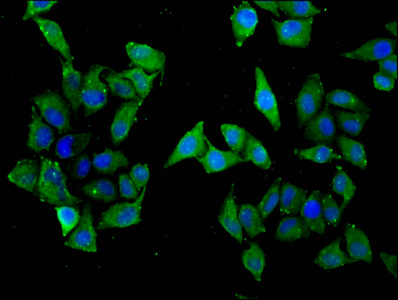Full Product Name
Rabbit anti-Homo sapiens (Human) SLC22A5 Polyclonal antibody
Alternative Names
CDSP antibody; High-affinity sodium-dependent carnitine cotransporter antibody; OCTN2 antibody; OCTN2VT antibody; Organic cation/carnitine transporter 2 antibody; S22A5_HUMAN antibody; Slc22a5 antibody; Solute carrier family 22 (organic cation/carnitine transporter) member 5 antibody; Solute carrier family 22 member 5 antibody
Immunogen
Recombinant Human Solute carrier family 22 member 5 protein (42-142AA)
Immunogen Species
Homo sapiens (Human)
Conjugate
Non-conjugated
The SLC22A5 Antibody (Product code: CSB-PA021460LA01HU) is Non-conjugated. For SLC22A5 Antibody with conjugates, please check the following table.
Available Conjugates
| Conjugate |
Product Code |
Product Name |
Application |
| HRP |
CSB-PA021460LB01HU |
SLC22A5 Antibody, HRP conjugated |
ELISA |
| FITC |
CSB-PA021460LC01HU |
SLC22A5 Antibody, FITC conjugated |
|
| Biotin |
CSB-PA021460LD01HU |
SLC22A5 Antibody, Biotin conjugated |
ELISA |
Purification Method
>95%, Protein G purified
Concentration
It differs from different batches. Please contact us to confirm it.
Buffer
Preservative: 0.03% Proclin 300
Constituents: 50% Glycerol, 0.01M PBS, pH 7.4
Tested Applications
ELISA, WB, IF
Recommended Dilution
| Application |
Recommended Dilution |
| WB |
1:500-1:5000 |
| IF |
1:20-1:200 |
Storage
Upon receipt, store at -20°C or -80°C. Avoid repeated freeze.
Lead Time
Basically, we can dispatch the products out in 1-3 working days after receiving your orders. Delivery time maybe differs from different purchasing way or location, please kindly consult your local distributors for specific delivery time.
Usage
For Research Use Only. Not for use in diagnostic or therapeutic procedures.








